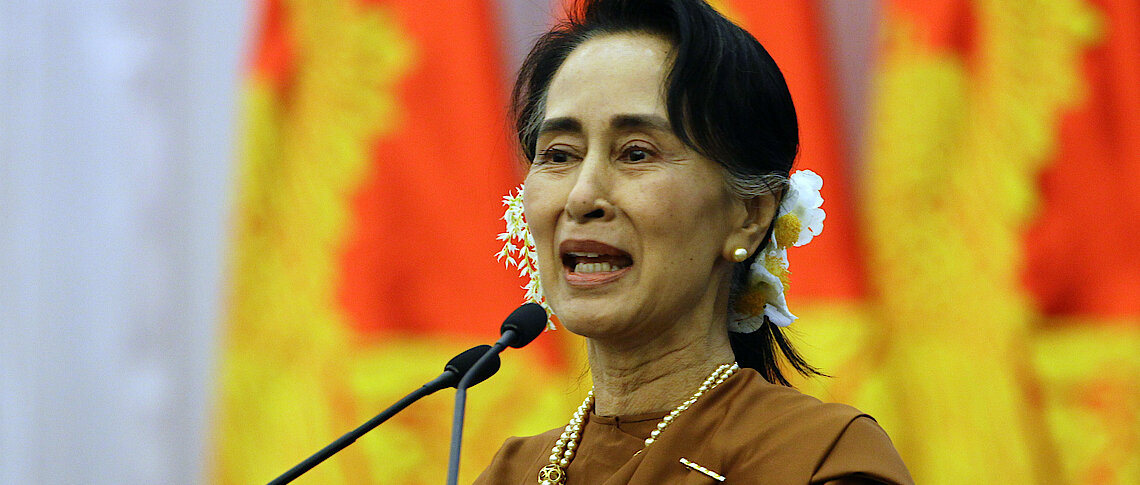The murder of prominent lawyer Ko Ni in Yangon on 29 January is a set-back for democracy in Myanmar. The constitutional lawyer was imprisoned for several years by the military junta which ruled the country until 2011 and was one of the few Muslims in the National League for Democracy (NLD), which is led by Nobel prize winner Aung San Suu Kyi. He was her principle legal advisor and championed the peaceful cohabitation of Myanmar’s different people groups and religions. Ko Ni strongly criticised the ‘race and religion laws’ which discriminate against minorities and were pushed through by Buddhist extremists in the previous government.
Ko Ni also criticised Aung San Suu Kyi and the NLD for not having chosen a single Muslim candidate to stand at the 2015 elections for fear of reprisals from Buddhist nationalists. Nevertheless, he helped ‘the Lady’, as the NLD President is known, to her party’s most significant election victory and the leadership of the government. The Constitution, which was drawn up by the military, forbids Aung San Suu Kyi from taking on the role of President, since her children are foreign nationals. This led to Ko Ni creating the post of State Counsellor, a role which sees the Lady coordinate ministries and thus de facto head up the government.
Most recently, Ko Ni was working on plans to ensure the constitution, which grants the military a veto right, could be changed by referendum and thus side-line the generals. However, waiting for a car at Yangon airport after a work trip to Indonesia, he was shot from behind at point-blank range.
“Enemy” of the military and Buddhist hardliners
The assailant - a convicted petit criminal who had benefitted from an amnesty introduced by the previous government - went on to shoot a second man. He later revealed he had been promised a car in exchange for the murder. The hitman’s client, whose motive is still not clear, was promptly arrested. Military and Buddhist hardliners are suspected of backing the attack, though hard evidence is difficult to come by.
The murder shocked Myanmar, with the NLD condemning it as ‘politically motivated’. However, the lack of response from Suu Kyi herself has been disappointing. She has not expressed her condolences to Ko Ni’s widow, and - like every other government minister – did not attend the murdered politician’s funeral. Suu Kyi was, however, present at the funeral of Aung Thaung, an MP from the military junta’s Union Solidarity and Development Party (USDP). The former general was a hardliner who had lined his pockets whilst serving as Minister of Industry.
Tellingly the State-run Global New Light of Myanmar newspaper removed its report of Ko Ni’s murder from the front page.
A warning shot for Aung San Suu Kyi
The murder was also a warning shot for Aung San Suu Kyi. The 71-year old, famed for defying the military for decades, is now showing disquieting restraint. The Nobel Peace Prize winner has refused to speak out against military offensives and related human rights violations in the northern state of Kachin and the southern state of Shan, which have seen at least 100,000 people displaced over the last year.
Minorities had hoped for freedom under Aung San Suu Kyi. They are now struggling to perceive a clear difference between her and the military junta. Admittedly, the Nobel prize winner has inherited a difficult situation, since she has no control over the military. Suu Kyi’s five-day peace conference last August has had only limited effect. Half of the armed groups in Myanmar are refusing a ceasefire, which they see as capitulation, until they can negotiate political reforms.
Under the leadership of the Nobel Peace Prize winner, Myanmar is no closer to peace. In fact, minorities see Suu Kyi as a representative of the dominant Buddhist Burmese. Even her international reputation has taken a hit, thanks to her weak response to the plight of over 1,000 Rohingya Muslims living in Burma, whom many regard as illegal immigrants from Bangladesh. Pogroms in 2012 saw tens of thousands flee their homes. Since then, some 100,000 Rohingyas have been living in makeshift camps, often with no access to jobs, education or medical care.
The murder of nine Burmese border guards by a Rohingya militia in October sparked brutal reprisals from Myanmar’s army. According to human rights groups, some 1,200 houses were burned to the ground, 86 people killed, 450 arrested and countless women raped. Some 66,000 Rohingyas fled to Bangladesh. Reacting to international criticism, the Myanmar government accused the Rohingyas of torching their own houses in a bid to tarnish the country’s image.
A Nobel prize winner under fire
In December, 23 peace laureates, leaders and activists wrote an open letter accusing Suu Kyi of not doing enough to curb the “ethnic cleansing and crimes against humanity” directed against the Rohingya. The Pope and several UN bodies and Pope Francis have also voiced their concerns. Despite this, Suu Kyi has failed to call on the military to show restraint, a move which seems to have encouraged further atrocities.
Despite her continuing popularity and the legitimacy of her desire to avoid conflict with the generals, Suu Kyi’s strategy undermines her credibility and thus her ability to implement the reforms she is seeking to usher in. To progress in her aims, she needs to strengthen ties with civil society and bolster those political institutions not controlled by the military.
At national level, there is no viable alternative to Aung San Suu Kyi. The USDP, formerly led by the junta, has no credible counterpart, whilst the ethnic minority parties may gain sufficient ground in the April by-elections to dent the NLD’s influence, but certainly cannot replace them.






